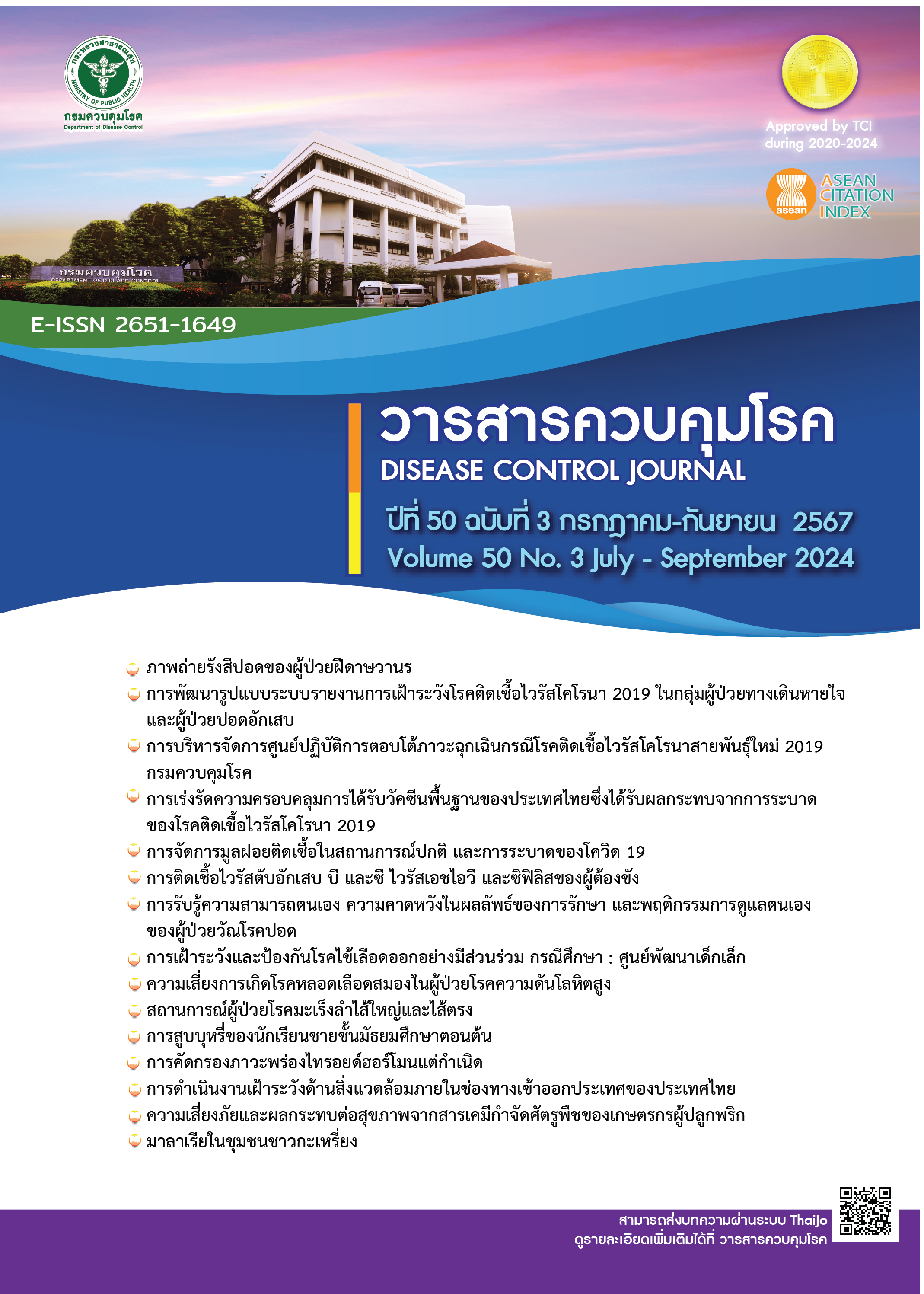The capacity for infectious waste management in Thailand under normal circumstances and during the COVID-19 pandemic
DOI:
https://doi.org/10.14456/dcj.2024.36Keywords:
infectious waste management capacity, infectious waste, management of infectious waste, COVID-19Abstract
This study aimed to (1) assess the capacity of Thailand's primary infectious waste management facilities and (2) compare their capacity under normal circumstances (2017-2019) versus during the COVID-19 pandemic (2020-2022). Data on infectious waste volumes in Thailand from 2017 to 2022 were analyzed using descriptive statistics, based on information collected from the Bureau of Environmental Health, Department of Health, Ministry of Public Health. Results revealed that infectious waste volumes increased from 78,330 tons during normal circumstances to 150,527 tons during COVID-19 pandemic. Currently, 19 agencies provide infectious waste disposal services in Thailand, with a total capacity of 188,321 tons per year, comprising 18 waste incineration plants (186,479 tons/year) and one steam sterilizer (1,752 tons/year). The study found that Thailand has sufficient capacity to dispose of infectious waste, with 58.4% excess capacity under normal circumstances and 20.1% excess capacity during the pandemic. However, only 89.74-98.4% of infectious waste from various sources was properly disposed according to standard procedures. The accumulation of untreated infectious waste primarily occurs due to improper waste segregation at the source, leading to a significant amount of accumulated infectious waste before the disposal stage. This research concludes that comprehensive monitoring of infectious waste generation requires mandatory reporting from all sources to address the challenge of infectious waste management, particularly during public health crises.
Downloads
References
Pollution Control Department (TH). Action plan for Country waste management Phase 2 (2023-2027) [Internet]. [cited 2024 Jan 31]. Available from: https://env.anamai.moph.go.th/th/waste-management-action-plan/download?id=98732&mid=37662&mkey=m_document&lang=th&did=30304 (in Thai)
Department of Health, Bureau of Environmental Health (TH). Planning for Infectious Waste Management Phase 1 (2022-2027) [Internet]. [cited 2023 Jul 22]. Available from: https://env.anamai.moph.go.th/th/infectious-waste/download/?did=211244&id=97230&reload= (in Thai)
Ministry of Natural Resources and Environment (TH), Pollution Control Department. Thailand State of Pollution Report 2021 [Internet]. [cited 2023 May 14]. Available from: https://www.pcd.go.th/publication/26626 (in Thai)
Singh N, Tang Y, Zhang Z, Zheng C. COVID-19 waste management: Effective and successful measures in Wuhan, China. Resources, Conservation and Recycling 2020;163:1-2.
Vanapalli K, Sharma H, Ranjan V, Samal B, Bhattacharya J, Dubey B, et al. Challenges and strategies for effective plastic waste management during and post COVID-19 pandemic. Science of The Total Environment 2021;750:1-10.
Sarkulworawit C, Chitsawang S. Impact of the COVID-19 pandemic on illegal transboundary movement of plastic waste in Thailand. Journal of Social Sciences and Humanities 2022;48(1):17-36. (in Thai)
Department of Health (TH), Bureau of Environmental Health. Report on operational analysis results in the past 5 months First [Internet]. [cited 2023 May 14]. Available from: https://env.anamai.moph.go.th/web-upload/11xc410600758f76a9b83604e779b2d1de5/filecenter/kpi/66/3.31/1.2kpi3.31.pdf (in Thai)
Hansakul A, Pitaksanurat S, Srisatit T, Surit P. Infectious Waste Management in Ministry of Public Health Hospitals by Private Transport Sector: Case Study Hospitals in the Northeast in Thailand [Internet]. [cited 2024 Apr 29]. Available from: https://gsbooks.gs.kku.ac.th/53/grc11/files/hdo5.pdf (in Thai)
Saiwongpia K. Infectious Waste Management Model, Lampang Province [dissertation]. Bangkok: Thammasat University; 2016. 89 p. (in Thai)
Sari G, Hilmi I, Nurdiana A, Azizah A, Kasasiah A. Infectious Waste Management as the Effects of COVID-19 Pandemic in Indonesia. Asian Journal of Social Science and Management Technology 2021;2:62-75.
Agamuthu P, Barasarathi J. Clinical waste management under COVID-19 scenario in Malaysia. Waste Management & Research 2020;39:18-26.
Suttikampa S. A study of infectious waste management in the COVID-19 situation in Sisaket Hospital. Medical Journal of Sri Saket Surin Buriram Hospitals 2022;3:509-18. (in Thai)
Chandanachulaka S, Tookaew S, Krabkran P, Hirunrueng T, Sridaromont P. Study for Improving Infectious Waste Management Efficiency in Thailand. Thailand Journal of Health Promotion and Environmental Health 2021;3:116-28. (in Thai)
Zhao H, Liu H, Wei G, Zhang N, Qiao H, Gong Y, et al. A review on emergency disposal and management of medical waste during the COVID-19 pandemic in China. Sci Total Environ 2022;810:152302.
Downloads
Published
How to Cite
Issue
Section
License
Copyright (c) 2024 Disease Control Journal

This work is licensed under a Creative Commons Attribution-NonCommercial-NoDerivatives 4.0 International License.
Articles published in the Disease Control Journal are considered as academic work, research or analysis of the personal opinion of the authors, not the opinion of the Thailand Department of Disease Control or editorial team. The authors must be responsible for their articles.






